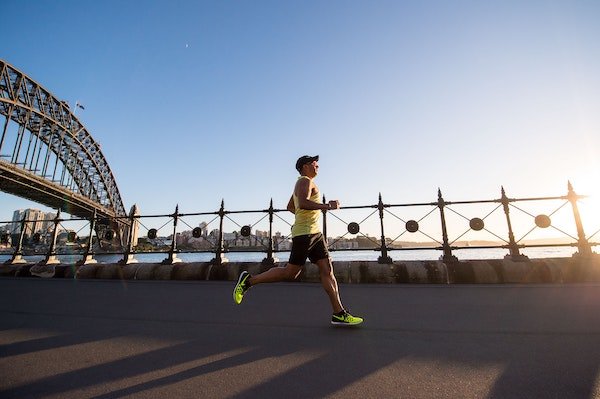Run It Out: The Science of Exercise And Stress/Depression/Anxiety
 Note from Amy 4/24/18: This article was written when I was a personal trainer and had my focus in different areas than I currently do. While much of this information is useful, there's an element of performance health in this piece that I no longer agree with. I've left it unedited so you can make the decisions for yourself, but if you have a history of disordered eating or over-exercising, you might want to sit this one out. xo AmyI frequently tout the benefits of strength training on this blog. And for good reason.
Note from Amy 4/24/18: This article was written when I was a personal trainer and had my focus in different areas than I currently do. While much of this information is useful, there's an element of performance health in this piece that I no longer agree with. I've left it unedited so you can make the decisions for yourself, but if you have a history of disordered eating or over-exercising, you might want to sit this one out. xo AmyI frequently tout the benefits of strength training on this blog. And for good reason.
Strength training:
•raises your metabolic rate
•helps slow down the aging effects on the body
•burns fat
•builds lean muscle
•keeps your brain sharp
•makes you a badass (ok, that's subjective)
Recently, a lot of authorities in fitness have come out against long slow cardio training: they say it's a waste of time and raises cortisol levels. In other words, they are pro-anaerobic cardio (sprints or strength training circuits) and anti-aerobic (longer, more moderate activities such as running, elliptical machines, and biking).There is a lot to be said for their case. Long slow cardio can have a cortisol-boosting effect on the body.Cortisol is not a friend of ours in today's society. The stress hormone tells your body to store fat because it thinks you're under attack or dying: it shifts your metabolism to your brain, more or less, so that you'll be sure to have enough fuel to make quick decisions in the face of danger... and I guess in Paleolithic times, this makes sense. But we're past that now, and we aren't going to evolve past that reaction in our lifetime.What we're left with is a non-six pack and chronic stress, which can lead to anxiety and depression.If you're killing it with the long runs, and not allowing your body enough time to recover, you force your body into a state of chronic stress.No bueno, folks.But not all steady-state cardio has this effect, and not everybody reacts in the same way to it.Where I come from is a bit different than the hardcore, physique-focused trainers.I use exercise to train my body, as well as to medicate it.Let me explain...
I run. I'm a runner.
Though many people would scoff at this because I don't run more than 4 miles at a time anymore (unless I'm doing a 10k with my clients, which I do bi-annually), I do consider myself a runner. Why? Because I consider running my zen place.When I run, I turn on my music and I concentrate on the thoughts I'm having, focused completely on them without any distractions (damn you, Pinterest!).It's safe to say that 80% of my epiphanies come to me while I'm running.My first video post? I decided on that while I was running.My empowerment retreat that I want to host? About 2 miles into an easy 3-miler, it came to me.
Running is the surefire way to find my inner peace without turning to medication.
For me, this is worth a lot. Even if it isn't the most efficient use of my workout time in a get-lean sense.It's my head-clearing time. It's my get-focused time. It's my chill-out time.My history with anxiety and depression is not just a history. I still struggle with it sometimes. It is a chemical imbalance and sometimes it's just worse than others.But I know exactly what to do when I start feeling this way. That empowering voice in the back of my head screams out:GO RUN!And I do. And I pull out of it. Even if it's temporary. I know that if I do it tomorrow too, I'll pull out of it again.And to prove that it's not just me and that this can help you as well if you deal with anxiety, depression or even plain old STRESS, let's go over a bit of the science behind it.One of my favorite, most enlightening books is Spark: The Revolutionary New Science of Exercise and the Brain, by John J. Ratey
Here are a few bonuses that come from aerobic exercise:
•it elevates brain-derived neurotrophic factor, slowing cognitive decline and strengthening your capacity for and rate of learning, and protects neurons against the corrosive effects of cortisol (exercise boosts BDNF at least as much as antidepressants if not more)
•it promotes brain growth
•it prevents stress by beating it to the punch: self-inflicted physical stress helps ready the body to cope with emotional or physical stress when it comes around unexpectedly
•it balances neurotransmitters in the brain that promote focus
•it interrupts the mental feedback loop of anxiety within the brain
•it reduces muscle tension, which in turn, reduces anxiety
•it regulates all the neurotransmitters targeted by antidepressants, thus waking up the brain and improving self-esteem
...and that isn't even all of them.For all these reasons, I'll admit it: you may catch me on the elliptical from time to time.All my fitness friends are calling blasphemy right now, but it's true. Sometimes I just get a magazine, prop myself on an elliptical and just go at a moderate pace while I read for however long I feel like it. So sue me....ok ok, I don't usually do those elliptical jaunts all by their lonesome. They're usually strategically done after hard strength sessions as a sort of elongated cool down. But their head-clearing effects are life-savers during stressful weeks.
Do you deal with anxiety, depression or stress? Maybe all you need is a run to start pulling out of it.
One interesting tidbit of information that I also read in Spark is that, when performed by stress-cases, high-intensity anaerobic workouts actually had a detrimental effect on the body and brain. When you're stressed beyond belief, the body will interpret that extra strain as additional pressure, causing a cortisol release. Excess cortisol negatively affects memory, focus, fat metabolism (especially in the midsection) and can actually erode neurons!So much of my training now is geared toward getting my clients to a state of minimal cortisol. Depending on their situation, aerobic exercise may be better for just calming the nerves and gaining that space for inner peace, or if they handle stress pretty well, I'll start them on sprints right away, knowing that they'll recover easily.Remember when I said stop working against your personality? Well I'm going to repeat it here, too.You need to do some research as to what works for you and what your body needs right now. It will change, and you have to learn how to change with it.Here are some of my recommendations...
If you're:
Super Stressed Out
I'm glad you're reading this post. I emphasize the results that anaerobic work gets you physically on this blog a lot. But chilling your brain out is just as important if you want to maintain those results.Concentrate on sticking to your strength training 2-3 times per week, and add at least one day of either yoga or longer runs, walks, bike rides, or elliptical sessions.Take the time to zone out and concentrate on you.Thing is: you're pushing so hard in your daily life that you're stressing yourself out, right? You need a chunk of time to slow down, and reprogram your stress response. By relaxing, you can temper that extra cortisol that comes from high-stress lifestyles, and achieve results more easily than you would just going-going-going all the time.By actively putting your body through a moderate amount of stress through aerobic activity, you are teaching your body that it can handle more, and therefore you will gain resilience in the face of future stress.If you are already extremely active, make sure you are taking enough rest days. You're body needs that time to recover, otherwise your constant state of cortisol is heightened, causing all that nonsense I talked about above.Having a ridiculously hard time at work? Maybe now's not the time to start training for a marathon even though you've never run more than 3 miles at a time. Start slowly, and work your way up. Life is not a sprint, it's a marathon (yes, I am fully aware of the irony in this). You'll get there. Trust it. Don't rush it.
Ready to Change, Low-Stress and Have The Time To Commit
YES! Go kill it!Aim for a sturdy routine of 2-3 strength sessions per week, working in cardio circuits until you're short of breath. Combine this with one day of sprint intervals and one day of longer, slower, more mind-clearing cardio.Your body won't know what's coming, which is ideal for gaining strength, power and endurance!Just make sure that you are taking enough time to recover. If your body starts feeling consistently fatigued, sore, and weak, take a couple extra days off or replace one of your strength days with an aerobic, steady state workout.
Feeling Down and Unmotivated
I feel you. Been there, done that. Let's turn this mood around, shall we?GO OUTSIDE.There is something magical about working out outside. Connecting with nature, even in big cities (go to a park!), is a great way to start putting focus outside of yourself.Depression is an obsession with the past and projection of those events onto your future. If you can get out of that frame of mind, you will do wonders for your outlook. This is why getting outside, shifting your focus to everything that is beautiful around you, is so helpful.Give your brain a break from the downward spiral of the blues.Commit to going outside for even 20 minutes, 4x/week. Do some kind of activity that feels moderate to you, and just take in the sights. Look up at the sky. Take in the birds. Feel the sun on your face.The activity will release feel-good hormones while literally giving you a breath of fresh air. It helps to have these hormones flowing through you when you're actively trying to shift your focus to gratitude and positivity: it makes it a lot easier.When you just want to curl up and sleep through the day, the most important thing you can do is get out and MOVE.Break the cycle. It's the only way you'll change.
Feeling Anxious or Experiencing Lack of Focus
Ok, this one can go either way. This may take a bit of guess and check.Try both short-burst intense workouts (such as sprints, HIIT, or cardio circuits) and long, slow cardio or moderate weight lifting.Every person responds differently depending on their level of stress and preferred method of physical activity.Some people focus better after working themselves to fatigue in an intense strength workout: pushing themselves to the limit brings them a state of clarity.Others focus better after thinking it through on a longer run or walk, like I do.No way is wrong or right. They're just different.Both of these workouts provide an amount of stress on your body that promote focus and action (instead of procrastination). Depending on your body's current ability to handle stress, one of these methods will most likely do wonders for you.Experiment and let me know below which way works best for you. Just curious...
Bored With Your Workouts
So if this one isn't obvious already, here's what I have to say about this circumstance:DO THE OPPOSITE OF WHAT YOU'RE DOING NOW.That means, if you're doing more steady state workouts (where your heart rate doesn't really spike up and down), push yourself to your limit next time around. Dabble in fast-paced full-body circuits, or try a bootcamp class somewhere.And if you're doing only HIIT or CrossFit-type workouts, try mixing it up by trying a steady-state aerobic workout such as walking, swimming, biking or jogging.Bottom line is this: your body responds best to switching it up because it is then forced to adapt to the new stresses put upon it. Your brain, however, likes some semblance of routine, but that could mean routine with working it out to the max, or calming it down with an easy run. Every body is different. Honor yours by trying different things and finding what works for you.***** If you're like me, and you use exercise as a sort of meditation or even medication, it's not necessary that you focus each session on being the most efficient, lean-mass-building, body-fat-blasting 45 minutes of your day. Even if you don't yet, but you find that chronic stress is dominating your day-to-day, give it a shot. Studies show it's good for you. ;)If you're worried about turning to steady-state cardio because of the cortisol effect and the effect it might have on your physique, the answer lies in rest and recovery. The reason why some marathoners have a softer look to their midsections (which isn't bad, btw) is because they don't give their bodies enough rest, raising the levels of cortisol in the body to a constant high.Vary your workouts. Take rest days.And when it all comes down to it, have fun! That's what exercise should be about. Sure, you get awesome results, but if you're not enjoying it, I bet it will take longer to start seeing them.Give yourself over to it. ALLOW it to be fun.So what works best for you? When it comes to working out, do you prefer high-intensity strength sessions, long runs, or both? I'd love to hear what you're all doing, and if I can help you in any way!
If you're like me, and you use exercise as a sort of meditation or even medication, it's not necessary that you focus each session on being the most efficient, lean-mass-building, body-fat-blasting 45 minutes of your day. Even if you don't yet, but you find that chronic stress is dominating your day-to-day, give it a shot. Studies show it's good for you. ;)If you're worried about turning to steady-state cardio because of the cortisol effect and the effect it might have on your physique, the answer lies in rest and recovery. The reason why some marathoners have a softer look to their midsections (which isn't bad, btw) is because they don't give their bodies enough rest, raising the levels of cortisol in the body to a constant high.Vary your workouts. Take rest days.And when it all comes down to it, have fun! That's what exercise should be about. Sure, you get awesome results, but if you're not enjoying it, I bet it will take longer to start seeing them.Give yourself over to it. ALLOW it to be fun.So what works best for you? When it comes to working out, do you prefer high-intensity strength sessions, long runs, or both? I'd love to hear what you're all doing, and if I can help you in any way!
Photo 1 ("Woman running by the ocean at sunset") by logobloom adapted by me from Fotolia (purchased with license)Photo 2 by Chander R on UnsplashPhoto 3 by Andrew Tanglao on UnsplashPhoto 4 by Emma Simpson on Unsplash